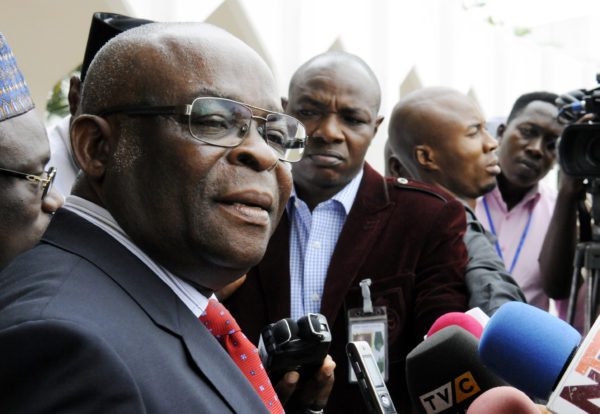News
Buhari accepts voluntary retirement of Onnoghen, appoints 5 new Justices of Supreme Court

President Muhammadu Buhari has accepted the voluntary retirement from service of Justice Walter Onnoghen as Chief Justice of Nigeria, effective from May 28, 2019.
A statement by the President’s Senior Special Assistant on Media and Publicity, Malam Garba Shehu, confirmed this in Abuja on Sunday.
The statement reported the President as thanking Onnoghen for his service to the country and wished him the best of retirement life.
Onneghen was born on the Dec. 22, 1950 at Okurike Town, Biase Local Government Area of Cross Rivers.
He began his primary school education at the Presbyterian Primary School, Okurike Town between 1959 and 1965.
Before his appointment as the Chief Justice of the Federation, he worked with the Ministry of Justice, Ikeja, Lagos; Ogun, between 1978 and 1979 as the Pupil State Counsel.
Between 1989 – 1998, he was a High Court Judge of Cross River Judiciary.
During his time as the High Court Judge of Cross River, he was made the Chairman of Cross River State Armed Robbery and Firm Arms Tribunal and he held the post for 3 years from 1990 – 1993.
Sometime in 1996 while still holding the post of High Court Judge of Cross River, he was appointed the Chairman, Judicial Enquiry into the Crisis between Students of the University of Calabar and Obufa Esuk Orok Community, Calabar.
In 1998, he was the Chairman, Failed Banks Tribunal, Ibadan Zone.
Between 1992 and 2004, he served as the Judge, High Court of Rivers, while from 1998 to 2005, he served as Justice of the Court of Appeal.
In 2007, Justice Onnoghen played a huge role in 2007 election which saw the Late Umaru Yar’adua as President of Nigeria.
He had a dissenting judgment that annulled the presidential election. His position was however a minority judgment.
After being nominated as the Chief Justice of the Supreme Court of Nigeria by the Acting President, Prof. Yemi Osinbajo, he was confirmed by the Senate on March 1, 2017, and sworn in on March 7
Onnoghen’s trials for false assets declaration started when a petition was filed by the civil rights group at the Code of Conduct Bureau (CCB), alleging that he owned sundry accounts.
It alleged the accounts were primarily funded through cash deposits made by himself up to as recently as Aug. 10, 2016, which appeared to have been run in a manner inconsistent with financial transparency and the code of conduct for public officials.
The trial began on Jan. 14 at Code of Conduct Tribunal but Onnoghen was absent.
On Feb. 11, the council set up a preliminary complaints assessment committee to review the responses given to it by Onnoghen, and Muhammad who is acting in his stead.
Onnoghen is accused of failing to fully declare his assets, while Muhammad is facing allegations of misconduct.
The NJC said it reconvened and resolved to constitute into the Preliminary Complaints Assessment Committee in accordance with Regulation 17 of the National Judicial Council Judicial Discipline Regulations, 2017.
Meanwhile, President Buhari has written the Acting Chief Justice of Nigeria, Justice Tanko Muhammad, on the appointment of additional five Justices of the Supreme Court of Nigeria.
Shehu said the President wrote: ‘‘Pursuant to the provisions of Section 230(2) A&B of the Constitution of the Federal Republic of Nigeria, 1999 (as amended), I am pleased to request that you initiate in earnest the process of appointing additional five Justices of the Supreme Court of Nigeria to make the full complement of 21 Justices as provided by the aforementioned provisions of the Constitution.
‘‘This is in line with the Government’s Agenda of repositioning the Judiciary in general and Supreme Court in particular for greater efficiency, with a view to reducing the backlogs of appeals pending at the Supreme Court.
‘‘Please accept, your Lordship, the assurances of my highest regards.’’




 Davido's Net Worth & Lifestyle
Davido's Net Worth & Lifestyle 
